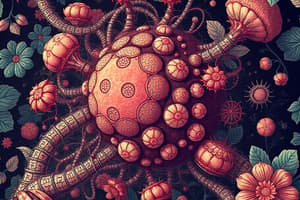Podcast
Questions and Answers
What term is used to describe an abnormal mass of tissue that may be solid or fluid-filled?
What term is used to describe an abnormal mass of tissue that may be solid or fluid-filled?
- Sarcoma
- Melanoma
- Carcinoma
- Neoplasm (correct)
Which of the following best describes a benign tumor?
Which of the following best describes a benign tumor?
- Can metastasize to other parts of the body
- Cells resemble normal cells (correct)
- Always cancerous
- Usually poses a health threat
What type of tumor arises from glandular epithelial tissue?
What type of tumor arises from glandular epithelial tissue?
- Sarcomas
- Adenomas (correct)
- Melanomas
- Lymphomas
Which factor is NOT commonly linked to the growth of benign tumors?
Which factor is NOT commonly linked to the growth of benign tumors?
What distinguishes a pre-malignant tumor from a benign tumor?
What distinguishes a pre-malignant tumor from a benign tumor?
Which treatment option is typically NOT needed for benign tumors?
Which treatment option is typically NOT needed for benign tumors?
Which type of tumor grows on fibrous or connective tissue of any organ in the body?
Which type of tumor grows on fibrous or connective tissue of any organ in the body?
Which type of tumor consists of adipose tissue (fat cells)?
Which type of tumor consists of adipose tissue (fat cells)?
What is the process by which cancer cells spread from their primary site to distant locations in the human body called?
What is the process by which cancer cells spread from their primary site to distant locations in the human body called?
Which type of tumor is able to invade surrounding tissues and is cancerous?
Which type of tumor is able to invade surrounding tissues and is cancerous?
What is a common type of birthmark that is a build-up of blood vessel cells in the skin or internal organs?
What is a common type of birthmark that is a build-up of blood vessel cells in the skin or internal organs?
Which type of tumor is derived from the skin or tissues that line body organs?
Which type of tumor is derived from the skin or tissues that line body organs?
What is the function of the p53 gene?
What is the function of the p53 gene?
Which environmental pollutant is known to cause lung cancer?
Which environmental pollutant is known to cause lung cancer?
Which behavior is NOT recommended for preventing cancer?
Which behavior is NOT recommended for preventing cancer?
What type of cancers are considered sun-related?
What type of cancers are considered sun-related?
Which DNA viruses are known to cause specific cancers?
Which DNA viruses are known to cause specific cancers?
What do statistical studies suggest about dietary guidelines and cancer risk?
What do statistical studies suggest about dietary guidelines and cancer risk?
What type of cancer had the highest incidence for men in 103 countries or territories in 2015?
What type of cancer had the highest incidence for men in 103 countries or territories in 2015?
Which type of cancers begins in cells of the lobules or ducts of the breast?
Which type of cancers begins in cells of the lobules or ducts of the breast?
What is a risk factor for breast cancer related to weight?
What is a risk factor for breast cancer related to weight?
Which type of cancer was the leading cause of cancer deaths for men in 29 countries in 2015?
Which type of cancer was the leading cause of cancer deaths for men in 29 countries in 2015?
In 2015, which type of cancer had 810,000 deaths worldwide?
In 2015, which type of cancer had 810,000 deaths worldwide?
What are some stromal tissues where breast cancer can less commonly begin?
What are some stromal tissues where breast cancer can less commonly begin?
Which activity can help reduce the risk of cancer according to the American Cancer Society?
Which activity can help reduce the risk of cancer according to the American Cancer Society?
What can alcohol consumption potentially affect, increasing cancer risk?
What can alcohol consumption potentially affect, increasing cancer risk?
What is a significant risk factor for breast cancer after gender?
What is a significant risk factor for breast cancer after gender?
Which type of mastectomy involves removing all breast tissue including skin, fatty tissue, lobules, and ducts?
Which type of mastectomy involves removing all breast tissue including skin, fatty tissue, lobules, and ducts?
What does a lumpectomy usually involve?
What does a lumpectomy usually involve?
Which type of therapy involves using biological agents or immunotherapy for cancer treatment?
Which type of therapy involves using biological agents or immunotherapy for cancer treatment?
Flashcards are hidden until you start studying
Study Notes
Types of Tumors
- Fibroids grow on fibrous or connective tissue of any organ in the body, e.g. uterine fibroids.
- Lipomas are the most common form of soft-tissue tumor, consisting of adipose tissue (fat cells).
- Haemangiomas are a build-up of blood vessel cells in the skin or internal organs, often appearing as a common type of birthmark.
Characteristics of Tumors
- A benign tumor is an abnormal mass of tissue that may be solid or fluid-filled, and cannot metastasize.
- Cells of a benign tumor resemble normal cells, and most are not harmful to human health.
- Malignant tumors are cancerous, grow fast, and can spread (metastasize) to distant locations in the body.
Causes of Benign Tumors
- Often the cause is unknown, but growth may be linked to environmental toxins, exposure to radiation, genetics, diet, stress, local trauma or injury, or inflammation or infection.
Examples of Benign Tumors
- Adenomas arise from glandular epithelial tissue, e.g. bile duct, follicular, hepatocellular, and nipple adenomas.
- Uterine fibroids are common examples of benign tumors.
Characteristics of Malignant Tumors
- Cancer in situ is a malignant tumor found in its place of origin.
- Metastasis is the process by which cancer cells spread from their primary site to distant locations in the body.
Types of Malignant Tumors
- Carcinoma is derived from the skin or tissues that line body organs (epithelial cells), e.g. carcinomas of the stomach, prostate, pancreas, lung, liver, colon, or breast.
Causes of Cancer
- Environmental carcinogens, such as pollutants, industrial chemicals, and certain DNA viruses, can cause specific cancers.
- Cancer can also be caused by exposure to radiation, certain chemicals, and diet.
Prevention of Cancer
- Behaviors that help prevent cancer include avoiding tobacco, sunbathing, and radiation exposure, getting vaccinated, and following a healthy diet.
Common Cancers
- Breast cancer is a malignant tumor that develops from breast cells, and can begin in the lobules, ducts, or stromal tissues.
- Prostate cancer grows locally within the prostate, often for many years.
- Other common cancers include stomach, liver, non-Hodgkin lymphoma, leukemia, bladder, and cervical cancer.
Risk Factors of Breast Cancer
- Age, family history, and medical history are significant risk factors.
- Other risk factors include weight, lack of exercise, alcohol consumption, and diet.
Treatment of Breast Cancer
- Treatment options depend on several factors, including type, stage, and education.
- Options may include lumpectomy, mastectomy, biological or targeted therapy, chemotherapy, hormone therapy, and radiation.
Studying That Suits You
Use AI to generate personalized quizzes and flashcards to suit your learning preferences.




